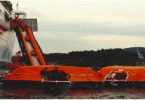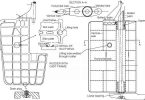Cargo information shall be confirmed in writing and by appropriate shipping documents prior to loading.
The cargo information shall include:
- The BCSN when the cargo is listed in IMSBC code. Secondary names may be used in addition to the BCSN; ( Each solid bulk cargo in IMSBC code has been assigned a Bulk Cargo Shipping Name (BCSN). When a solid bulk cargo is carried by sea it shall be identified in the transport documentation by the BCSN. The BCSN shall be supplemented with the United Nations (UN) number when the cargo is dangerous goods.)
- The cargo group (A and B, A, B or C);
- The IMO Class of the cargo, if applicable;
- The UN number preceded by letters UN for the cargo, if applicable;
- The total quantity of the cargo offered;
- The stowage factor;
- The need for trimming and the trimming procedures, as necessary;
- The likelihood of shifting, including angle of repose, if applicable;
- Additional information in the form of a certificate on the moisture content of the cargo and its transportable moisture limit in the case of a concentrate or other cargo which may liquefy;
- Likelihood of formation of a wet base
- Toxic or flammable gases which may be generated by cargo, if applicable;
- Flammability, toxicity, corrosiveness and propensity to oxygen depletion of the cargo, if applicable;
- Self-heating properties of the cargo, and the need for trimming, if applicable;
- Properties on emission of flammable gases in contact with water, if applicable;
- Radioactive properties, if applicable; and
- Any other information required by national authorities.
Note :-
The primary aim of the International Maritime Solid Bulk Cargoes Code (IMSBC Code), which replaces the Code of Safe Practice for Solid Bulk Cargoes (BC Code), is to facilitate the safe stowage and shipment of solid bulk cargoes by providing information on the dangers associated with the shipment of certain types of solid bulk cargoes and instructions on the procedures to be adopted when the shipment of solid bulk cargoes is contemplated.
The IMSBC Code, adopted on 4 December 2008 by resolution MSC.268 (85l, entered into force on 1 January 2011, from which date it was made mandatory under the provisions of the SOLAS Convention. The Code was amended by resolution MSC.318 (89), incorporating amendment 01-11, which entered into force on 1 January 2013. The Code was further amended by resolution MSC.354(92), incorporating amendment 02-l3, which may be applied from 1 January 2014 on a voluntary basis, anticipating its envisaged official entry into force on 1 January 2015,
IMSBC Code is supplemented by the Code of Practice for the Safe Loading and Unloading of Bulk Carriers (BLU Code including BLU Manual) & recommendation on the safe use of pesticides in ships applicable to the fumigation of cargo holds. It also includes a directory of contact names and addresses of offices of designated national competent authorities responsible for the safe carriage of grain and solid bulk cargoes. IMSBC Code and supplement is commended to Administrations, ship owners, shippers and masters and all others concerned with the standards to be applied in the safe stowage and shipment of solid bulk cargoes, excluding grain.





